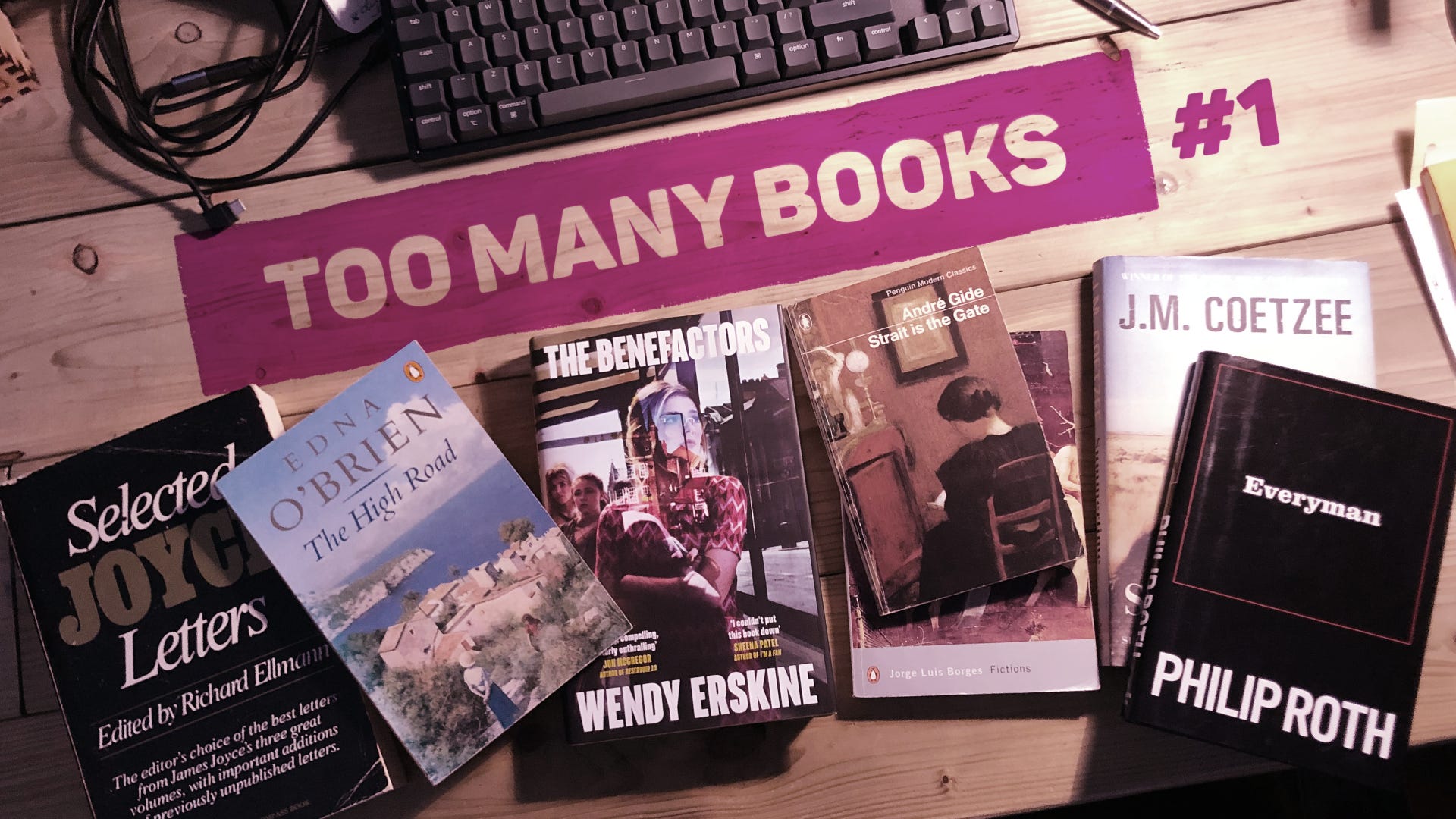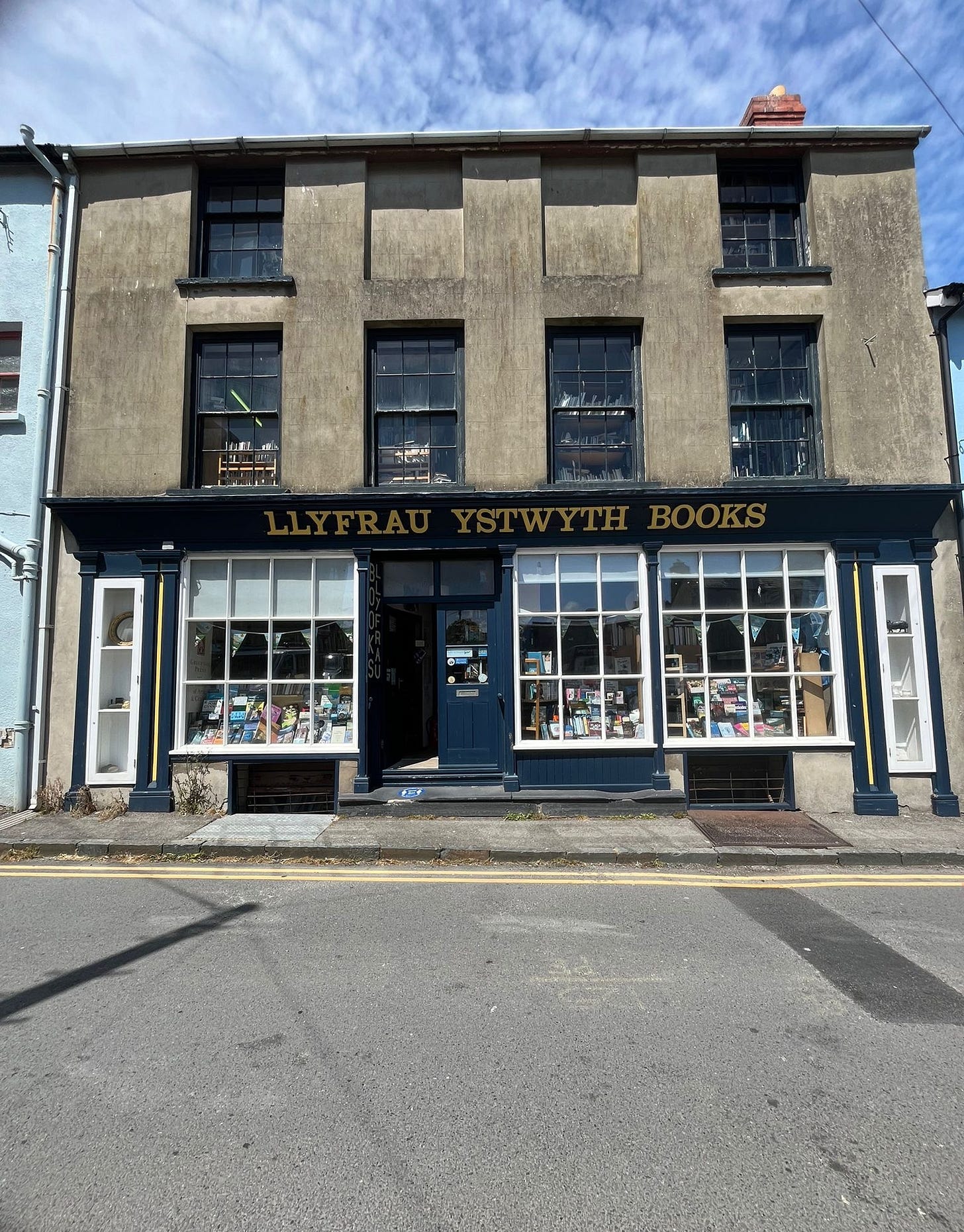Too Many Books #1 - Aberystwyth
You begin to wonder (in second person) if you have a book-buying problem. Despite this, you spend two days in Aberystwyth and buy some more.
When it comes to owning books, specifically physical books, how many is too many? Is it five hundred, a thousand, more? Or—you ask yourself—is this a daft question and there is no such thing? What separates a “collection” from a burgeoning disorder? Where’s the line and are you even aware if you’ve crossed it?
Like most other addictive pastimes, suspecting you have an issue means you probably have one. Admission, they say, is the first step towards recovery.
And so . . . [draws breath]
Your name is K and you’re a book-buying addic—Wait! Hold back that last airy consonant. You’re not quite there yet. Truly. Call it denial—or cope, as the kids now say—but it feels a tad premature. You still have some restraint. Some.
Of all the vices, losing one’s inhibitions in a bookstore every so often has got to be the mildest, right? Instead of feeding pound coins to fruit machines for a brief dazzlement of lights and excitable sound effects, you can (and do) spend that same coinage in musky second-hand bookstores, and come away with lightly-worn copies of, say, Dubliners and Herzog1 —Jackpot!
The town where you live has none. Well, there’s The Works, but does that really count? Even the WHSmiths where you did your school work experience is no longer around. All this is to say, these book binges are not a daily occurrence. Should you get the itch, the jitters, the hankering to get down with a bit of cheeky D. H. Lawrence, an outing needs to be arranged.
Just recently you were in Aberystwyth for a short camping trip. With the tent propped up and secure to the ground, you hastened off into town to grab some food but, more importantly, get to Waterstones before it shut. You made it there and so had the newly released book you were after: Wendy Erskine’s The Benefactors. At the till you exchanged two small pieces of paper for the three-hundred-plus bound pages of paper and left the cheery vendor close up for the evening.
It rained all day, all night and sheep in the adjoining field bleated and baaed throughout. You watched Jaws 2 on the iPad and eventually (miraculously) got some sleep. By morning, the new airbed you slept on had deflated.
The next day began with coffee, a full-English and a visit to the nearby town of Machynlleth where, between the charity stores and the quaint Literary Cat Books, you bought a few slim paperbacks: Fictions by Jorges Luis Borges, The High Road by Edna O’Brien and Strait is the Gate by André Gide, an old (but always preferable) A-format Penguin Modern Classics edition.
Back to Aberystwyth, now sunny, you popped into Llyfrau Ystwyth Books, a wonderful, higgledy-piggledy emporium, with a separate space upstairs for classics and hardback lit-fic. There you picked up Summertime by J.M. Coetzee, Selected Letters of James Joyce (edited by Richard Ellmann), and Everyman by Philip Roth, which you already owned—and might just be your favourite Roth book2—but its condition was simply too good to pass up.
After a pleasant walk along the seafront, another coffee, you decide to grab a baguette meal deal at the SPAR and head back early to the campsite to lounge in the sun and read. You zipped through Breeding Ground by Shaun Hutson, his follow-up to Slugs, which you read on your last camping trip. Hutson, you heard, was the basis of the character Garth Marenghi and, since watching the show, you can’t help but hear Matthew Holness’s voice narrating the pages of comically excessive gore3. With no third book in the series, you will have to find another bug- or woodland-critter-themed pulp horror title for the next outdoors getaway, for it’s oddly become tradition.
The noisy sheep were herded that evening to another field. You thought you’d have a better night because of this, but instead you were kept awake by the snores of a neighbouring camper. Since sleep wasn’t an option, you watched Misery, followed by The ‘Burbs on the iPad. Again the airbed deflated.
Seven books.
Upon returning home you sort the new, unread acquisitions into corresponding piles, all except the Gide which you begin later that night. No, you say to yourself, eyeing those inefficient bookcases, you don’t have a book-buying problem. If anything you have a space issue, i.e. not having enough. A better system is what you need—a better system and more spacious bookcases.
Just then you spot The Sound and the Fury, horizontally stacked alongside one of the units. It cost you 79p at an Oxfam somewhere4, and you have yet to read it (hence it being stacked horizontally). You take it down, open it and sniff its pages. Its scent is both sweet and rosy like Turkish Delight.
With a cover you didn’t actually love, but a serviceable copy all the same. You told yourself you would upgrade this to a handsomer edition when you love the book as much as you know you will.
(You did end up loving it and did indeed eventually acquire a not-pristine but decent hardcover, which now stands alongside the other Bellow’s you first read in paperback and summarily upgraded to hardback, having become quite the admirer of Mr. Bellow’s writing and them not being overly expensive.)
Either that or The Counterlife (keeping in mind you have two or three Roth’s still to read).
Try it for yourself:
Pain, intense, excruciating pain suddenly tore through him and he cried out. A guttural, rasping groan . . . Another slug penetrated his anus, joining its bloated companion in a murderous act of blood-stained sodomy.
You can’t remember—possibly Dorset?





Haha! That sounds just like Garth Marenghi!